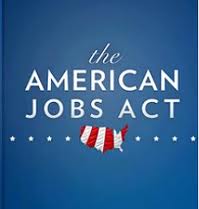JOBS ACT
 The American Jobs (Jumpstart Our Business Startups) Act, also known more simply as the Jobs Act was a series of bills that were formally proposed to a joint session of Congress to jumpstart the economy, presented in a televised speech that aired in 2011. The legislation, written by the Obama administration, was supported by many Democrats and Republican legislators. The Jobs Act recieved support from both the Senate and House of Representatives and was signed into law in April of 2012.
The American Jobs (Jumpstart Our Business Startups) Act, also known more simply as the Jobs Act was a series of bills that were formally proposed to a joint session of Congress to jumpstart the economy, presented in a televised speech that aired in 2011. The legislation, written by the Obama administration, was supported by many Democrats and Republican legislators. The Jobs Act recieved support from both the Senate and House of Representatives and was signed into law in April of 2012.
This bill, which totals in $447 billion in provisions, does many things in an attempt to boost the American economy. The Jobs Act will cut $245 billion in payroll taxes, boost spend of $62 billion to expand programs whose purpose is to put people back to work, continue to offer unemployment benefits for 6 million people who have been out of work for a long term period as well as providing an $8 billion dollar tax credit for those who fall into the long term unemployment category. In addition to these crucial items, the Jobs Act will pay $5 billion into the Pathways Back to Work Fund, $50 billion into infrastructure, $30 billion in job protection for teachers, police officers and other civic workers, $30 billion into school modernization, and $15 billion into hiring construction workers to refurbish foreclosed homes.
The National Infrastructure Bank
The Jobs Act, monetary goals aside, also looked to establish the National Infrastructure Bank, which serves the goal of funding infrastructure projects, the creation of an wireless network to expand high speed service, stricter regulations against businesses who discriminated against those who had been unemployed for the long term, and making it easiter for small businesses throughout the country to implement crowdfunding.
JOBS ACT and the SEC
The American Jobs Act is crucial for the economy, hit hard by the recession and the housing and financial collapse of 2008. The ability to crowdfund, making it easy for small businesses to go IPO and providing modernized more relevant rules for established private companies are just a few reasons why this piece of legislation is so important. From the date of signing, the American Jobs Act gave 90 days (or until July 4th) to implement changes that were made to the Securities Act Rule 506 and other advertising and security legislation, which was a deadline that was not met, but is a work in progress. The SEC, the Securities and Exchange Commission, is looking t0 release the first slew of rules that target solicitation of investors for small businesses, which is said to be completed in the middle of August of 2012.
The larger, more comprehensive set of rules on crowdfunding are the next big deadline markered in the legislation, and are due in January of next year. By all reports, the SEC has stated that they will be able to meet this larger deadline. Until the upcoming January 2013 deadline, no other major dates in the legislation are upcoming. One piece of the Jobs Act that will directly impact small businesses around the country, which will be finalized in 2013, is the cap on public investment and who is allowed to invest in startups. Prior to this Act being passed, it was very difficult for companies to seek investors. Now, more people who are considered accredited investors, or most of the general public, will be able to invest and provide funds to startups that need every investment that they can get.
JOBS ACT and Crowdfunding
As a business owner, one of the biggest benefits that this legislation will provide you, is the power to crowdfund. What is crowdfunding, you ask? Well, crowdfunding is when individuals, in this case startup business owners, tap into their resources and industry networks using social media and the web to raise funds for their business. Crowdfunding is used in many contemporary fundraising efforts, including disaster relief for Hurricane Katrina, political campaigns and even software development. With the small business owner in mind, legislators looked to create a list of Crowdfunding Rules, which will allow business owners to implement this method to generate much needed capital for their businesses.
SEC Approved Crowdfunding Platforms
Once finalized, small business owners will be able to use SEC-approved platforms to crowdfund, which allows money to be donated by anyone who believes in the business. Through crowdfunding, according to the bill, these business owners will have a cap of $1 million per year that can be raised via crowdfunding, will looking to minimize financial risk. To minimize this risk, the amount an individual donater can invest will be determined by their income. For investors in the income bracket of less than $100K will be able to donate up to 5% per year and for those who make more than $100K, they will be able to invest up to 10% per year. To further protections within this $1 million dollar cap, small businesses will be required to post consumer protection materials on their crowdfunding sites. In terms of company stock, the Act also eliminated the shareholder rule, which stated that only a company could only have 500 shareholders, before it registered with the SEC. Companies will now have the opportunity to sell up to $50 million in shares, and have more than 1,000 investors before going public with the SEC.